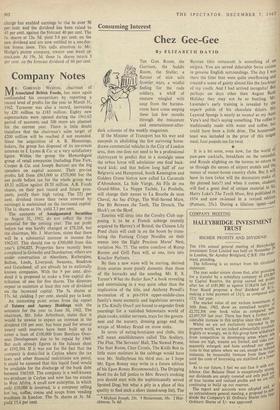Company Notes
MR. GARFIELD WESTON, chairman of Associated British Foods, has once again confounded his competitors by reporting a record level of profits for the year to March 31, 1962. Turnover was also a record, increasing by £20 million to £183 million. Eighty new supermarkets were opened during the 1961/62 period of accounts and 100 more are planned for the current year. There is little doubt therefore that the chairman's sales target of £200 million will be reached if not exceeded. Since the acquisition of A. B. Hemmings, bakers, the group has disposed of its ice-cream interests to J. Lyons & Co. at a very satisfactory figure. Within the group the Howardsgate group of retail companies (including Fine Fare, Cooper & Co. and Joseph Burton) are the big spenders on capital account. Their pre-tax profits fell from £863,000 to £529,000 but the net profit before tax for the whole group was £9.32 million against £8.70 million. A.B. Foods shares, on their past record and future pros- pects, justify their high rating. The 221 per cent, dividend (more than twice covered by earnings) is maintained on the increased capital. The Is. shares at 10s. yield 2.3 per cent.
The accounts of Amalgamated Securities to August 31, 1962, do not reflect the true potential for the coming year. The net profit before tax was hardly changed at £78,268, but the chairman, Mr. J. Morrison, states that there will be a substantial increase in income for 1962/63. This should rise to £300,000 from this year's £196,025. Properties have recently been completed in Grimsby and Dumbarton; others are under construction at Aberdeen, Rutherglen, Bolton, Leeds, Liverpool, Swansea, Stockton and Gateshead; all are already let to nationally known companies. With the 9 per cent. divi- dend it is proposed to make a free capital dis- tribution of one for five shares. The directors expect to maintain at least this rate of dividend on the increased capital. The 5s. shares at 17s. 6d. yielding 3 per cent. should pay to keep.
An interesting point arises from the report of Estates and Agency Holdings with the accounts for the year to June 30, 1962. The chairman, Mr. John Arbuthnot, states that it would be unwise to expect an increase in the dividend (10 per cent, has been paid for several years) until reserves have been built up to cover a loan of £100,000 from Barclays Over- seas Development due to be repaid by 1969. But cash already figures in the balance sheet at £192,504. If it was not for the fact that the company is domiciled in Ceylon where the tax laws and other financial restrictions are penal, it could be assumed that this liquid fund would be available for the discharge of the bank debt between 1965/69. The company is a well-known tea-producer in Ceylon and now has tea estates in West Africa. A small new enterprise, in which only £10,000 is involved, is a company selling hot tea, coffee, cocoa and soups from vending machines in London. The 5s. shares at 3s. 3d. yield 15.4 per cent.






































 Previous page
Previous page